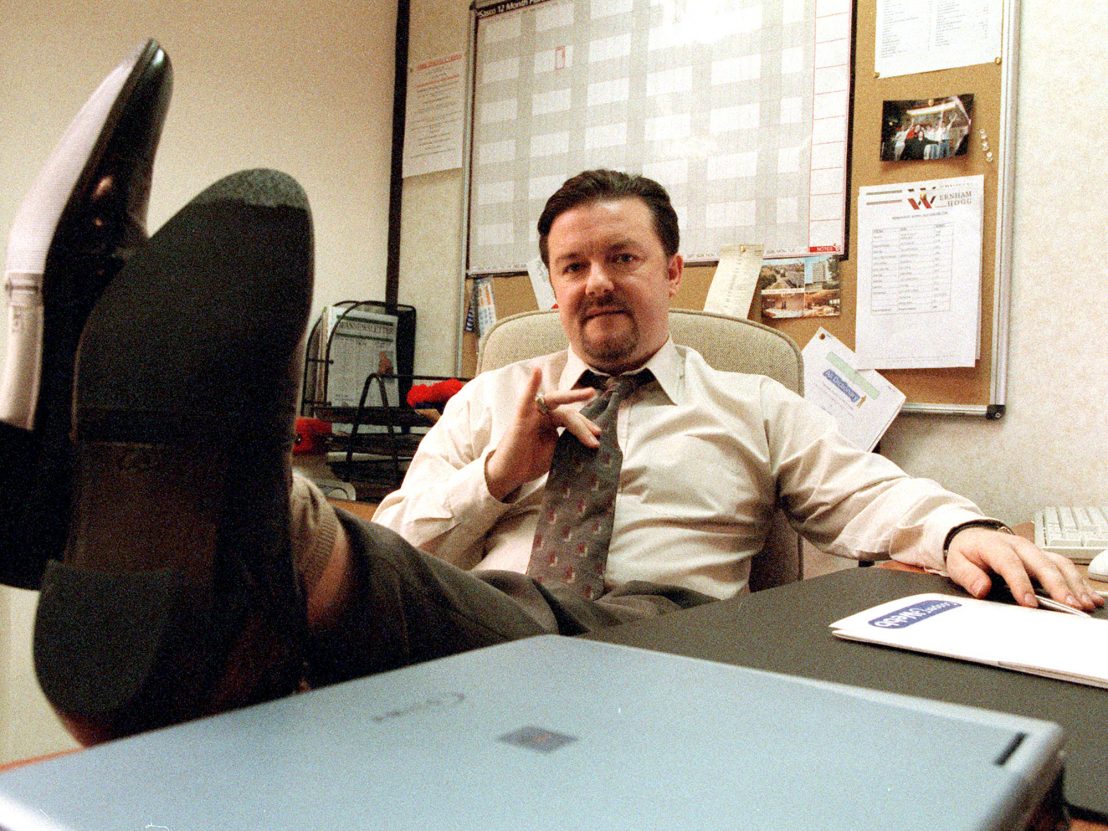
It shouldn’t have worked. When The Office first aired on a Monday evening in July of 2001, nothing suggested an epochal event was in the offing. The first-time writer/directors, who had met at the London alternative radio station XFM, had no real experience to speak of. Stephen Merchant was the gangly, analytical half of the partnership who’d grown up wanting to emulate local hero John Cleese, another tall man from the West Country behind a beloved sitcom. Ricky Gervais, the show’s lead, was a failed pop star who’d spent years in middle management as the assistant events manager for the University of London Union. Not for nothing do they tell you to write what you know.
Merchant’s dream was to write the next Fawlty Towers, an ambition he achieved in his twenties. After leaving XFM and embarking on a production course at the BBC, he enlisted the funniest man he knew to take part in a short film entitled Seedy Boss; from the second Merchant pointed a camera at his friend and invited him to improvise as David Brent, it was clear the pair were on to something. A character emerged fully formed and, while there might be a bit of Brent in all of us, there’s a bit more in Gervais.
The wheel was not reinvented overnight. There was a 1999 Comedy Lab pilot for Channel 4 in which Gervais played a David Bowie-obsessed manager of a video rental company. There were shades of The Office but it was too broad – when it failed to be picked up for a full series the writers could hardly have believed that they would be working with the Thin White Duke himself within a decade.
In 2000, expanding on his obnoxious persona from The 11 O’Clock Show, Gervais fronted Meet Ricky Gervais, a Channel 4 chat show with a title that underlined its central premise; the host considered himself more important than the guests. It fell a long way short of Knowing Knowing You with Alan Partridge or The Larry Sanders Show with guests like Tommy Walsh and John Virgo. The host would later neatly reorder the title for Ricky Gervais Meets in 2006, a series of reverential interviews with his comedy heroes: Larry David, Christopher Guest and Garry Shandling.
The one thing Merchant and Gervais had on their side is that they’d actually shot something. The Office was not a script at the bottom of a draw in a BBC building but something which demonstrably worked on film. Veteran producer Jon Plowman, then Head of Comedy, commissioned a pilot script and, in the summer of 2001, the programme finally aired on BBC Two.
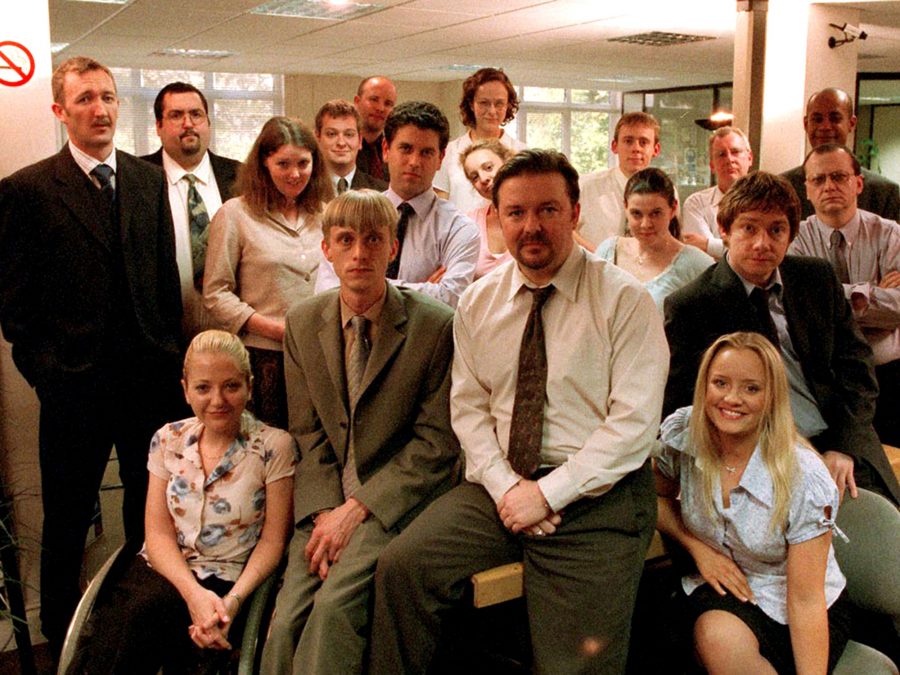
The Office is often credited for kick-starting the mockumentary genre in the lean years following This is Spinal Tap in 1984, but one senses that is simply because history is written by the winners. People Like Us, Human Remains and Marion and Geoff all preceded Gervais and Merchant, and there was a genuine feeling that this spoof documentary centred around a paper company, parodying docusoaps like Driving School and Airport (a show referenced in the finale of The Office), was slightly late to the party now that those shows were going out of fashion. By this point, even Maureen had passed her driving test.
The first series went out with little fanfare and its creators have delightedly claimed that, when it was test screened, the only thing that scored lower with audiences was women’s lawn bowls. Victor Lewis Smith, writing in The Evening Standard, branded the show a “summer stinker” and wondered “how this dross ever got beyond the pilot stage”. It was another huge mistake from the white man with dreadlocks.
A combination of word-of-mouth, repeats and the burgeoning advent of the DVD market saw The Office grow into a phenomenon in the 14-month gap between its first and second series. Gervais went on record claiming he hoped it might be 10 people’s favourite show rather than a hundred people’s tenth favourite show, citing The League of Gentlemen as the kind of cult favourite he’d like to emulate. He needn’t have worried – occasionally, as with The Beatles, pasta and Seinfeld, the masses get something exactly right.
“The Office’s enduring influence is with us in myriad subtler ways too, most notably in the way we speak (in a way).”
Watching the first episode back, it’s not hard to see why. From the moment Brent appears on screen obnoxiously clicking his pen and working his way through an array of obnoxious facial gestures, hand movements and meaningless management speak, it’s clear we are in the presence of greatness. There was always the sense that Gervais was purely instinctual and able to inhabit the character entirely the second the cameras started rolling.
In behind-the-scenes features, Merchant was always the one seen behind the computer typing while his partner threw out ideas. They were astute enough to know people tuned in for Brent but kept watching for Tim (Martin Freeman) and Dawn (Lucy Davis). And while there were clearly no lines drawn in the sand, one senses Gervais’ biggest contribution to the writing was in the character he played (further evidenced by the 2016 Brent film which saw no return for Merchant or any other original cast members).
The writing is a masterpiece of economy. Has there ever been a television character defined as quickly or efficiently as Gareth Keenan (Mackenzie Crook)? He enters the office, says “Wasssuuuppp” years after it was culturally relevant, smacks Tim in the head with a newspaper and asks if it’s his “time of the month” before adding, “Just the eight pints for me last night”. We know who he is and his relationship with Tim within a few seconds of screen time and not a hint of dialogue is wasted on exposition.
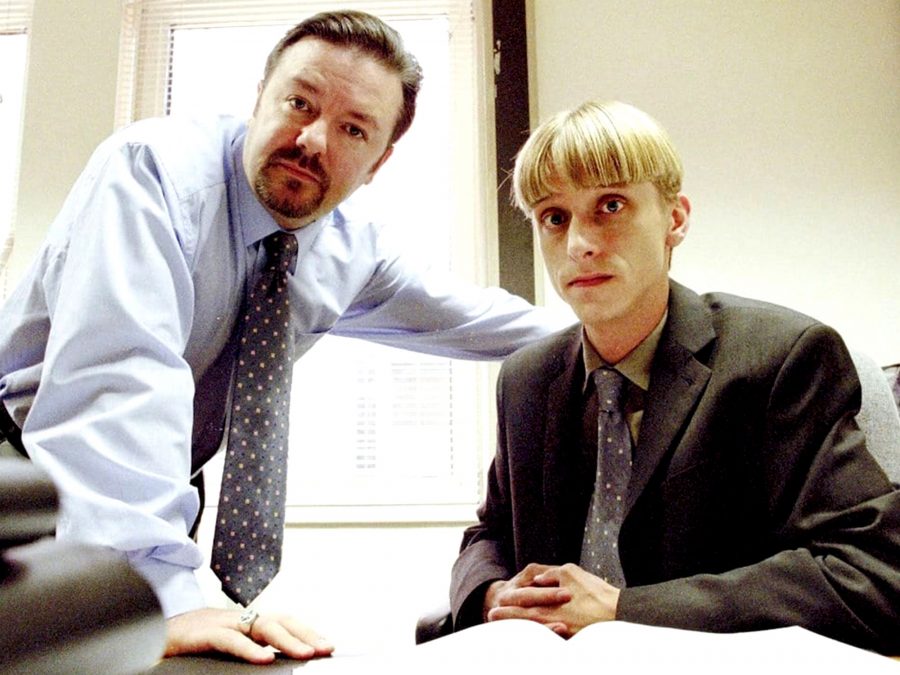
There were precedents, of course. Brent’s delusions of grandeur owe something to Captain Mainwaring, Basil Fawlty, Tony Hancock and, latterly, Alan Partridge. Tim was originally envisioned as a chubby, Norm from Cheers type, and the importance of that romance with Dawn has the air of those long-running American sitcoms with their heartfelt, romantic arcs.
The Office bowed out after two seasons and a flawless two-part Christmas special that would stand as the greatest British romantic comedy ever made had it been released in cinemas. Tim and Dawn kissed, Brent found love and, best of all, Chris Finch (Ralph Ineson) was told to fuck off. In the show’s final line, Brent looks into the camera and says, “Have you got everything you need? Cheers.” (For this and a host of other reasons, David Brent: Life on the Road has no reason to exist.)
The legacy of The Office is everywhere. The US version spawned shows like Modern Family and Parks and Recreation while the likes of This Country and People Just Do Nothing closer to home have taken the spirit of the original and brilliantly explored very different aspects of English culture. Its enduring influence is with us in myriad subtler ways too, most notably in the way we speak (in a way).
There’s even a Facebook group dedicated to repurposing lines from the show in inventive ways, such as a recent image of Gareth Southgate watching his England side triumph in a Euro 2020 match accompanied by the words, “Gareth, ultimate fantasy? Two midfielders, probably. Sitters. I’m just watching.” That is a pun deserving its own 20th anniversary retrospective when the time comes.
Occasionally with art, everything comes together and perfectly captures a moment. Gervais will continue to plug every new project like Noel Gallagher, claiming it’s the best thing he’s ever done. He’d be better off taking a leaf out of Joseph Heller’s book. The author of ‘Catch-22’ was frequently asked why he’d never written another book as good as his debut and, like Brent when asked if he’d rather be thought of as a funny man or a great boss, his answer was always the same: “Who has?”
Little White Lies is committed to championing great movies and the talented people who make them. But to keep going, and growing, we need your support. Become a member today.
Published 9 Jul 2021
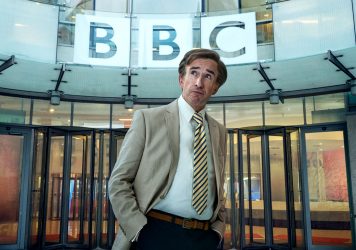
As Steve Coogan’s comedy alias returns to the BBC, the character’s co-creator and scriptwriters reflect on the journey so far.
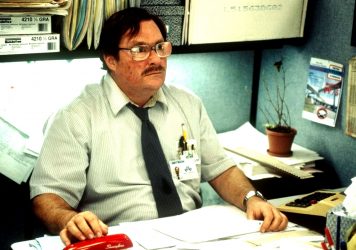
By Gem Wheeler
Mike Judge’s 1999 comedy brilliantly captured the dingy, coffee-ringed mundanity of the workplace.
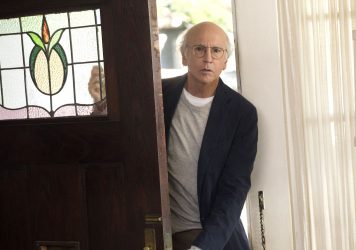
Larry David’s semi-improvised comedy paved the way for an entire new generation of shows.